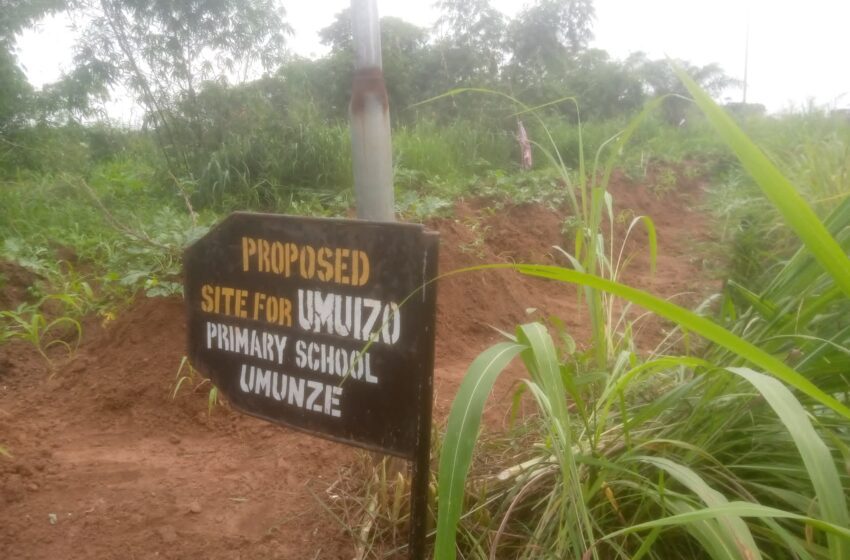Residents bicker over construction of delinquent children’s school in Anambra

By Abigail Mbah
In the heart of the Umunze community in Anambra State lies a vast expanse of land that was once a hopeful whisper of development. Now, bushes have overgrown that portion of land meant for the establishment of a school for delinquent children as the project remains uncompleted.
The only reminder of its existence is a four-coach block sitting on the foundation, five years after the community donated a portion of their land.
According to the state document from 2018 to 2022 derived from Budgetpedia, N45 million has been budgeted for the project implementation.
The previous commissioner for children and women affairs, Ndidi Mezue on 6th May 2019 assured the people of Umunze of the clearance and perimeter fencing of the site; but on a visit to the site in June 2024, it was discovered that this promise is yet to be fulfilled properly as there was no perimeter fencing but a dwarf fence of four coaches.
Why the delay

John Akanyonu, former president-general of the community said the delay was as a result of the community members’ grievances and the allegation levelled against him and the traditional ruler.
“The government actually came to start work, but they were disrupted by the community members following the fallacy (allegation) that I and the traditional ruler were compensated for the land by the government,” he said.
“This school would have been the first of its kind in Anambra and the whole South East of Nigeria if only it was built. Even though we sensitised the people about the need for the establishment, they were misled by some individuals and the project was brought to a halt,” he added.
READ ALSO
INVESTIGATION: Ogun LGA where the sick lack hospital, depend on herbs despite FG’s N64m project
INVESTIGATION: Odalo, Nigeria’s Twitter swindler faking “heart disease” to scam women
During the community’s general assembly in August 2023 under the leadership of Hypolite Olua, the immediate past president-general, a letter came from the Governor of the State, Charles Soludo, demanding the transfer of the donated land to the government for the overriding interest of the public.

“After reading out the letter to the people, there were two contradictory thoughts from them. Some said the location is not okay for them because it is our ancestral land called ‘ Mbala Izo/ Eke Izo’ which is used for our gatherings, some said the government can go ahead with the establishment,” Mr Olua said.
Mr Olua said no money was given to anyone in the community for compensation by the government.
“The people who sensed the school to be a prison stopped the contractor with the reason that a prison should not be sited in their residence because it may possibly bring prison break and other social vices in their locality,” he said.
Chinedu Onunkwo, a vigilante officer in Umunze laments the rate at which criminal activities by minors, like robbery, occur in the community.
“We treat so many criminal cases here in our office and many times these are carried out by children below 18 years old. Depending on the crime committed, we are forced to take them to adult prison which I know is not good but that’s the only option left for us,” he said.
He said that if only the school had been built, it would have made their work easier, and also make the community a peaceful place.
Joy Ihev, the head of department, Social Development and Community Development in Umunze local government noted the downsides of taking minors to adult prisons and the importance of building the school for delinquent children.
“Taking children to adult prisons will corrupt them the more thereby hardening them. But if taken to a delinquent home, they would be remanded and trained to be better citizens of the state,” she said.
Both Mr Akanyonu and Mr Olua said the establishment of the school for delinquent children does not contradict the community’s culture
“The project is to be built in line with the European union and British council standard, so it doesn’t have anything to violate our cultural code,” Mr Olua said.
How we manage juveniles – prison

The Controller-General for Correctional Services, Anambra State command Usifo Joseph, told this reporter that there is no juvenile in the adult prisons in the state.
“We don’t have juveniles. The people in our prisons are adults who due to small statures look like juveniles. So there’s no juvenile in the adult prisons in the State”, Mr Joseph said.
“The children we have in prison homes are not juvenile offenders, they are children born in the prison. We cannot take them out from their parents especially when they are still breastfeeding but they are given special attentions”, he added.
The state commissioner for children and women affairs, Ifenyinwa Obinabo, said the project will continue soon.
“When we previously started the work, the community started with a disturbance and we started interfacing with them. Also, we have insecurity as a challenge but the government is almost done with rectifying it. So we are about going back to site soon,” the commissioner said.
The current president-general of the community, Ezekiel Iheazor, and his deputy, Cheta Nnameka, would not speak about the project despite multiple attempts to get their comments.
The story was supported with funding from the Centre for Journalism Innovation and Development (CJID).

